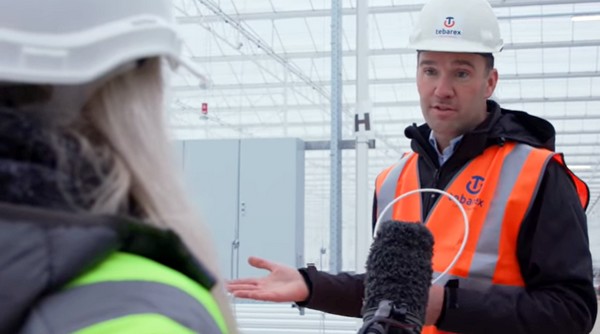It’s quite a feat – delivering 3 projects in the United Kingdom, despite the Brexit and the coronavirus pandemic. The wheels just keep turning. As Chris van Hulzen with Tebarex notes, fortunately the Stena Line connection between Hook of Holland and Harwich continued running. This was one of the few responsible ways to travel, circumventing the crowds at airports and train stations.
He regularly crosses the North Sea to keep an eye on the company’s projects. Chris: “It’s pretty strange. Only 200 people on a boat that’s big enough for 1500. In the mornings, there will be only 5-10 people eating in a restaurant that could easily serve breakfast to 200.”
Behind the scenes with the BBC
During one of his travels, while visiting greenhouse projects at Bury St. Edmunds and Norwich, Chris ran into BBC reporter Jen Copestake. The Norwich operation makes use of wastewater which is pumped across a distance of 2.5 kilometers to provide the greenhouse with heating.
While workers are putting in the finishing touches, Chris explains the technology behind the project. “We are providing the climate computer that is controlling the roof ventilation, the screening, the heating, the CO2, the evaporators, but also the irrigation.”
Millions of cucumbers
The greenhouse, with its growing gutters and high-wire systems, was developed to cultivate crops like cucumbers, tomatoes and peppers. In this particular greenhouse, 16 to 18 million cucumbers will be grown each year – about 3 to 4 percent of the UK’s annual consumption.
The report ends with a look at the technical room where the fertilizers are mixed and the irrigation water is processed, which makes use of UV sterilized rain- and recirculation water. The first plants will go into the greenhouse at the end of January, and in spring, the BBC will be back to take a look at how the crops are growing.
For more information:
Chris van Hulzen
Tebarex
www.tebarex.com
chris.vanhulzen@tebarex.com
tel +31 (0)85 483 2170










